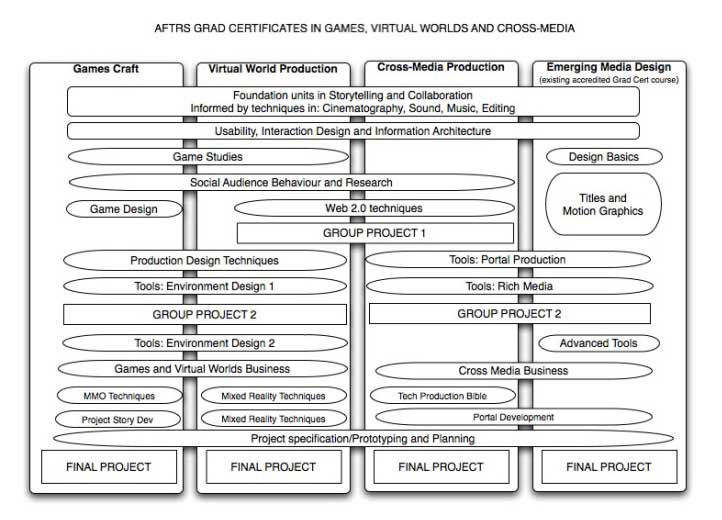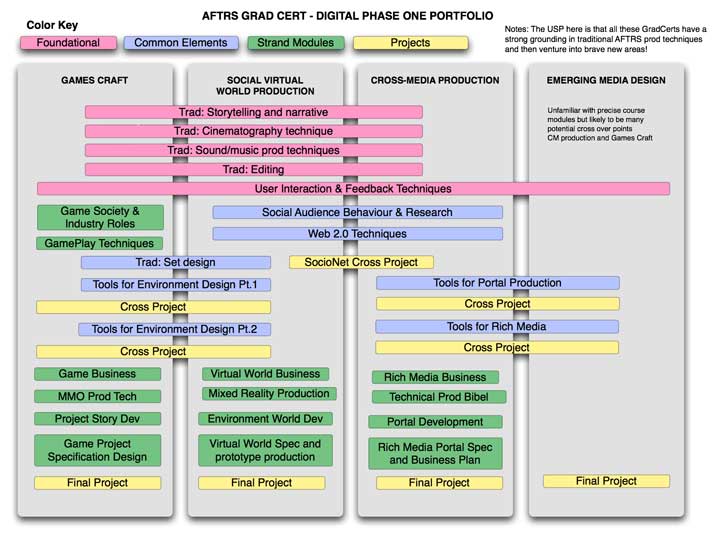DIGI GRAD CERT 2008
Contents
- 1 GRAD CERT NUMBERED TITLES
- 2 SCHOOL WIDE FOUNDATIONAL MODULES
- 3 MODULES COMMON ACROSS DIGI GRAD CERTS
- 4 MODULES OFFERED AS ELECTIVES TO OTHER SPECIALISATIONS
- 5 MODULES COMMON TO SOME OF DIGI GRAD CERTS
- 6 MOTION GRAPHICS AND EMERGING MEDIA DESIGN GRAD CERT MODULES
- 7 MULTI-DISCIPLINARY PROJECTS COMBINING DIGI GRAD CERTS AND OTHER DISCIPLINES
- 8 DEVELOPMENT CHARTS
- 9 RESEARCH
GRAD CERT NUMBERED TITLES
- Motion Graphics and Emerging Media Design
- Cross-Media Production
- 3D Animation
- Virtual World Production
- Games Craft - Scenario (Level Design) and Game Play
SCHOOL WIDE FOUNDATIONAL MODULES
- Thinking the Screen (Screen Studies) 4cp;
- Storytelling with Sound and Image 6cp;
- Media Economics or Sole Trader/IP, 1cp;
- Art of Creative Editing, 1cp;
- Mentored Project, 5cp.
MODULES COMMON ACROSS DIGI GRAD CERTS
- Usability, interaction design and Information Architecture
- Social audience behaviour and research
- Project Specification, Prototyping and Planning
- Scripting the interaction - dramatic structure vs play
MODULES OFFERED AS ELECTIVES TO OTHER SPECIALISATIONS
- Games Studies
- Game Sound Design
- Music for Games
- Game Production Design Techniques
- Environment Design
- Games and Virtual World Business
MODULES COMMON TO SOME OF DIGI GRAD CERTS
Numbers refer to list in Grad Cert Titles above
- Games Studies 4,5
- Writing for Immersive Interactivity 2,3,4,5
- Design Basics 1,2
- Titles and Motion Graphics 1
- Portal Production Tools 1,2,4
- Rich Media Tools 1,2
- Advanced Media Tools 2,4
- Cross-Media Business 2,4
- Technical Production Bible Cross-Media 1,2,4
- Web 2.0 Techniques 1,2,4
- Game Production Design Techniques 4,5
- Environment Design 4,5
- Games and Virtual World Business 4,5
- Mixed Reality Techniques 4,5
- MMO Techniques 4,5
- Project Development 4,5
MOTION GRAPHICS AND EMERGING MEDIA DESIGN GRAD CERT MODULES
(Proposed modules - these differ from current syllabus)
- Digital Design Basics
PHOTOSHOP / ILLUSTRATOR / INTRO TO FINAL CUT STUDIO / WORKFLOWS / PRODUCTION SCHEDULING
- Delivering for Digital Media
UNDERSTANDING DELIVERABLES / MORE FINAL CUT STUDIO / COMPRESSOR / DVD AUTHORING
- Type for the Screen
HISTORY OF TYPE / LETTERFORMS / SCREEN LEGIBILITY / ANIMATING TYPE IN AFTER EFFECTS / TITLE TOOLS IN FINAL CUT STUDIO
- Motion Graphics
HISTORY OF MOTION GRAPHICS / BASIC PRINCIPLES OF ANIMATION AND EDITING / MAKING GRAPHICS FOR TV / AFTER EFFECTS
- Usability, Interaction Design and Information Architecture
HISTORY OF NON LINEAR MEDIA / THEORIES OF INTERACTION / CROSS MEDIA PRODUCTION / FLASH
- Industry Brief A
LINEAR IDENT OR INTERSTITIAL
- Industry Brief B
CROSS MEDIA / NON LINEAR / IPTV INTERFACE
- Collaboration with other departments
FILM TITLE / CROSS MEDIA PROPOSAL / TV GRAPHICS PACKAGE
- Media Business Planning - (or equivalent)
- Screen Studies
MULTI-DISCIPLINARY PROJECTS COMBINING DIGI GRAD CERTS AND OTHER DISCIPLINES
- Cinematic Project - Working with editing and cinematography to use a games engine to create a trailer based cinematic and an interstitial cinematic as part of the gameplay
- A network game collaboration with Sound, Production Design and Level Design
- A casual game collaboration with emerging media design GCs and all Games Craft GCs
- A social network portal project combining Virtual World and Cross-Media GCs
DEVELOPMENT CHARTS
RESEARCH
Game Education around the world
A quick roundup of other game-related courses around the world.
Carnegie Mellon – Entertainment technology center.
The course is geared around collaborative groups of technical and artistic specialists. No-one is considered to need be across both. All projects are collaborative between these types. It is a two-year course, mostly devoted to focussed group project work. The curriculum breakdown is:
Semester 1
- Fundumentals of Entertainment Technology
- Building Virtual worlds
- improvisational acting
- the visual story
suggested electives include;
- game design
- maya
- art across media
- improvisational acting (again)
Semester 2 to 4
- interdisciplinary projects
The projects themselves seem varied - prototype games, virtual worlds and even animatronics.
The school also creates industry-focussed projects for graduate students, such as a project this year to create a game for the Independent Games Festival, as well as producing commissioned works for real clients (as diverse as other educational institutions and Northrop-Grumman), of which there are several running at any one time.
The facility has similar hardware/software to AFTRS, as well as a machine shop.
Overall, the emphasis seems to be on project-led team-building (reminiscent of LAMP) with real-world outcomes in the form of product. The courses at all times reinforces the idea of specialisation in creative and technical areas – to ‘do together what they cannot do alone.’
The course uses a game prototyping environment that is a combination of python scripting and a 3D open-source engine called Panda, which is essentially a C++ graphics library, but with Python bindings which allow communication within a Python script. The emphasis is on rapid turnaround, but Panda seems to have very sophisticated modules allowing for most modern real-time graphics techniques. It does require a high level of coding expertise.
At a more basic level, they've also developed an in-house scripting teaching aid called Alice, designed to teach the fundamental principles behind object oriented coding.
IT university of Copenhagen
Has a dedicated Masters in Media Technology and Games. It’s more regimented in structure, but also makes the distinction between Design and Analysis, and Technology. There are some cross-disciplinary opportunities, but the ultimate assumption is that students will specialize in one or the other.
Cerro Coso College in California
Delivers all it’s content online. It seems completely geared towards the design aspects of game production. Asset creation, animation, interface etc. There doesn’t seem to be any attention to technical concepts such as scripting, game engine design etc. It seems designed to provide cannon fodder.
Art Institute of California in San Francisco
Offers several specialized game-related courses, once again split across creative and technical areas. The Bsc of Game Art and Design concentrates on visual design and asset creation, whereas the Bsc in Visual and Game Programming concentrates on the technical. It is a 3 year bachelor course. Considered among top 5 gaming degrees.
DigiPen Institute of Technology in Vancouver
Created from a collaboration between an animation company looking for recruits and Nintendo. Offers degree programs in technical and creative areas. Organized along traditional bachelor degree lines, there is more emphasis placed on structured learning as opposed to collaborative project work.
Full Sail in Orlando
Apparently one of the top 5 gaming degree programs in the US . Very hip-looking program. The Game development program run over 21 months is very hard-core technical, and looks outstanding. The Digital Arts and design is a comprehensive overview of all things design. It looks a little scatter-gun, though. There seems little opportunity for true-cross disciplinary projects, as well. Gnomon school of VFX in California
Mainly concerned with VFX and animation, there are limited options for specific game-related subjects, mostly covering asset creation, with no subjects available for scripting or game design. University of Abertay Dundee in the UK
Offers a four-year Bsc in Computer Games Technology. It’s run along traditional University lines, with highly technical courses (no real creative asset creation). Little opportunity for cross-disciplinary teamwork.
QUT Bachelor of Games and Interactive Entertainment
http://www.newit.qut.edu.au/interactive/
Website information doesn't indicate course duration.
Professional recognition of this course is being sought from the Australian Computer Society (ACS) [1]
According to the Career Outcomes - Graduates can pursue opportunities as a games or digital media programmer, game developer, simulation designer or developer, industry entrepreneur, animator, film and television special effects developer, quality assurance tester, games/digital media reviewer, sound designer, mobile entertainment and communications developer, web developer or digital product strategist.
Areas of study include: Animation & Computational Arts, Digital Media, Game Design and Software Technologies.
Cross Media production notes and research worldwide
IPE Research Centre in Interactivity, Personalization and Experience at Bournemouth University
Overall areas of focus are:
- The Centre for Excellence in Media Practice/IPE collaboration: Viable relational tools: development of software incorporating the functionality of wikis, bibliographies, and folksonomies and pedagogical user-based research
- Children’s experience of online culture: exploration, censorship and the taboo
- Critical perspectives on consumption in computer-mediated communication
- Performativity: the user as performer; blurred boundaries of producer/author and user/reader/viewer
- The creation and experience of interactive, non-linear and multimodal narratives
- Blogging, subjectivity and citizen journalism
- Blogging as a tool for learning: the student experience
- Locative/Pervasive media: usability and the sociological aspects of mobile technologies
- Intercultural design: corruption, purity and cultural ‘fuzziness’
- Anarchism: the intersection between interactive art and biotechnology
- Online multiplayer gaming: relations between theorist/designer/coder/player/player/coder/designer/theorist
- Continuing techno-divides: access, knowledge exchange and elitism
IPE offers PhD's (and scholarships) in the following areas:
- PhD in Cross-Platform Media
- Networked Practices: Changing methodologies for interactive experience [
- Personalization and Experience
Courses seem quite theory based but also contain possibility of practically-based research.
"IPE seeks to establish collaborative interdisciplinary networks that diminish the perceived divide between the theory, production and experience of interactive, personalised, collaborative and increasingly mobile media forms"
REFERENCE BOOK: Cross-Media Service Delivery
Publication date may seem eons ago (2003) but the cross-disciplinary principles could be a solid foundation for teaching the basic principles of business concerns, services, platforms and delivery to audiences/participants
REFERENCE BOOK: E-Content: Technologies and Perspectives for the European Market
Published in 2005, this book examines (among other things), the quality of content created for a burgeoning market and a myriad of distribution platforms. A sage reminder to producers of every variety not to be blinded by technology at the expense of innovation and quality. Valuable also, in terms of providing an overview of European E-Content initiatives. Not just for the European market - students of Grad Cert courses at AFTRS could learn from this too.
Koln 2007 | Europa - Information Society
Interesting to see some of the thinking that may underpin the way we experience future Media in a practical sense. While a lot of it is theoretical and technical, most of it is familiar nonetheless. More interesting and useful are the networks associated with each area of "enquiry", where various individuals and entities get to state their "needs" for research partnership and pose as yet unanswered questions.
How should we generally showcase games to the school population?
This is not an insignificant question.
I'm gathering a collection of titles for our library. I've listed the ones I've sourced already below.
The question now is, what games can and should we be showcasing?
Titles so far:
PS3
Oblivion
XBOX 360
Gears of War Call of Duty 3
PS2
Ico
Shadow of the Colossus
God of War
Indigo Prophesy (aka Fahrenheit)
Okami
I think we should also have;
Half-Life 2 for PC
I'm trying for a healthy mixture of current 'box office' titles as well as hopefully ones with genuine artistic merit.
Please list any other games you think might be useful!

